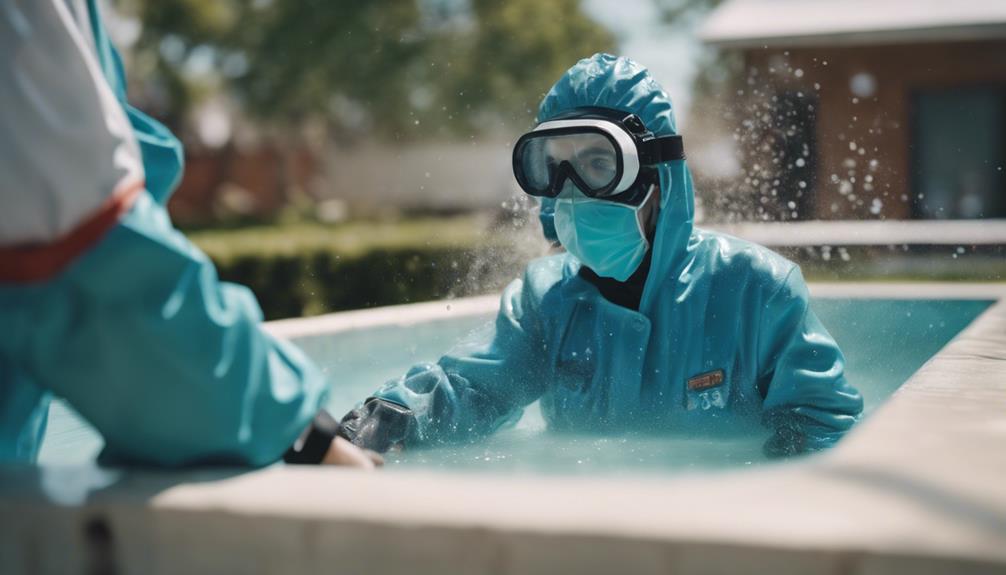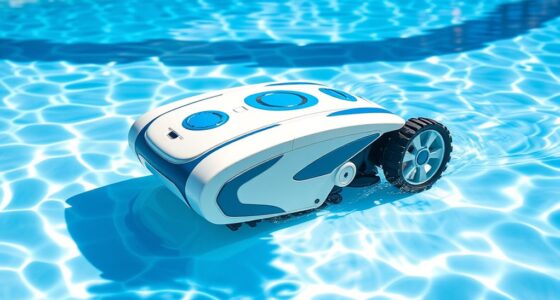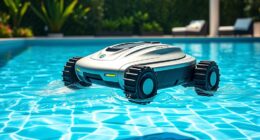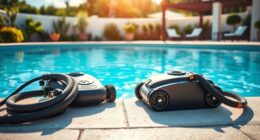For a chlorine-free pool, consider alternatives such as bromine, ionizers, ozonators, PHMB, saltwater systems, UV filtration, ozone generators, mineral systems, and enzyme pool cleaners. Bromine is recommended for those with sensitive skin but requires BCDMH tablets to prevent algae growth. Ionizers and ozonators help reduce chlorine levels, promote oxidation, and provide eco-friendly options. PHMB is gentle on the skin but comes at a higher cost. Saltwater systems offer easy maintenance. UV systems provide quick purification and energy efficiency. Proper installation is crucial for optimal performance. Ozone generators expedite the cleaning process. Mineral systems effectively combat bacteria. Enzyme pool cleaners break down oils for clearer water. Consider these options for a safe and crystal-clear swimming experience.
Key Takeaways
- Consider bromine, ionizers, ozonators, or PHMB for chlorine-free pool maintenance.
- Explore saltwater pools with gentler chlorine levels for a natural swimming experience.
- Opt for UV pool systems for efficient and cost-effective water purification.
- Use ozone generators or mineral systems as eco-friendly alternatives to chlorine.
- Enhance water clarity with enzyme pool cleaners that break down oils and debris effectively.
Bromine
Consider using bromine as an alternative to chlorine in your pool maintenance routine, especially if you have a chlorine allergy. Bromine is a suitable option for individuals prone to allergic reactions from chlorine exposure.
Unlike chlorine, bromine lacks strong oxidation properties, necessitating the use of BCDMH tablets to assist in water purification and maintenance. While effective, improper bromine usage can lead to green water, highlighting the importance of proper management techniques.
In addition to pool applications, bromine is commonly utilized in spa settings due to its gentler effects on the skin and eyes. Though more expensive than chlorine, bromine is favored for smaller spa applications where its skin-friendly properties are highly valued.
Despite the added cost, many spa owners opt for bromine over chlorine to provide a more comfortable and enjoyable experience for their guests. When considering pool or spa maintenance options, especially in cases of chlorine allergies, exploring the benefits of bromine may prove to be a worthwhile investment in your aquatic enjoyment.
Ionizers

Ionizers utilize two metals to release ions that attract bacteria and algae in pool water. These systems reduce the need for traditional sanitizers like chlorine, promoting eco-friendly pool water cleanliness through oxidation. While effective in chlorine reduction, ionizers may struggle with high dirt levels in the pool water, requiring continuous pump operation for best performance. Here is a comparison table to highlight the key aspects of ionizers:
| Aspect | Ionizers |
|---|---|
| Chlorine Reduction | Significant |
| Pool Water Cleanliness | Effective with regular pump operation |
| Eco-Friendly | Yes |
| Oxidation | Promotes oxidation of contaminants |
Opting for an ionizer system can be a cost-effective and environmentally friendly choice for maintaining your pool water. Keep in mind the importance of regular pump operation to ensure the effectiveness of ionizers in keeping your pool clean and safe for swimming.
Ozonators
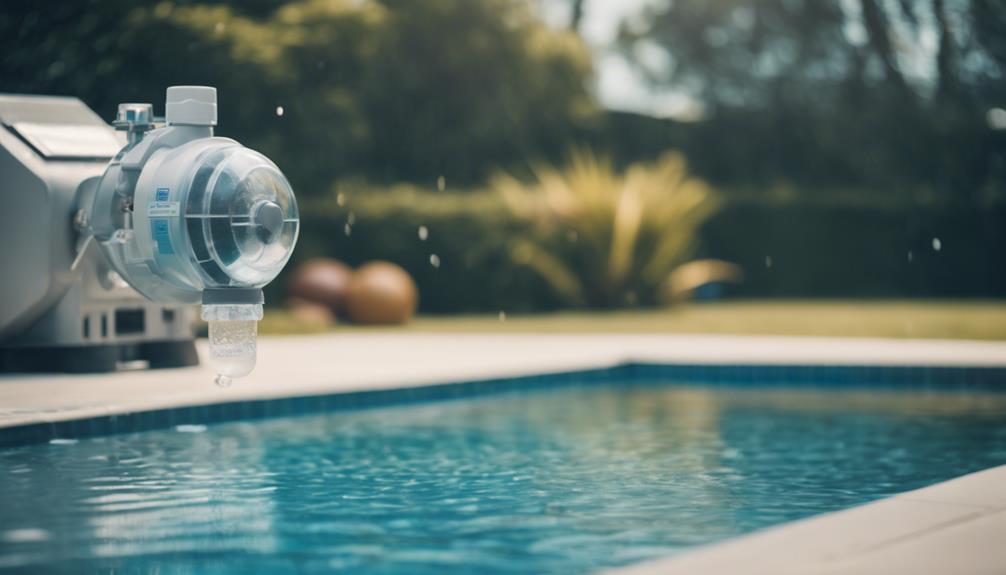
Ozonators offer an effective alternative for maintaining pool water cleanliness by reducing the need for chlorine by up to 90%. Here are some key points to take into account:
- Ozone Treatment:
Ozonators work by introducing ozone gas into the water, which reacts with impurities and reduces the reliance on chlorine for sanitation.
- Cost-Effective Solution:
While the initial investment for an ozone generator may start at around $600, the long-term benefits make it a cost-effective solution for pool water treatment when used in conjunction with a low level of chlorine.
- Chemical-Free Option:
Ozonators provide a chemical-free alternative for water treatment, making them an attractive choice for environmentally conscious pool owners seeking a chlorine alternative that's effective and eco-friendly.
PHMB
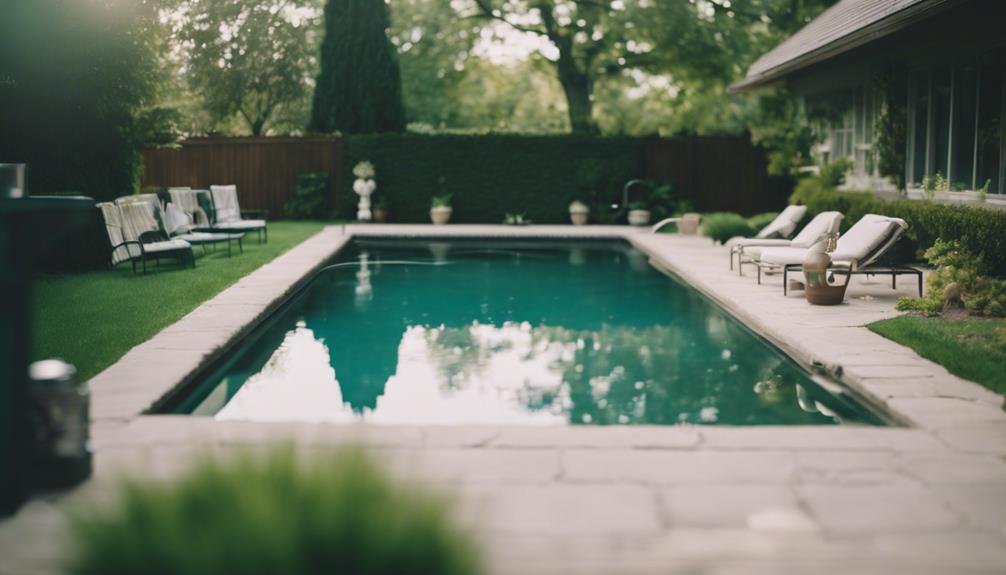
PHMB, also known as polyhexamethylene biguanide, offers an effective alternative to chlorine for pool sanitization. Unlike chlorine, PHMB remains stable in sunlight, providing reliable protection against contaminants.
Learning about PHMB effectiveness, its comparison to chlorine, and application tips can help you make an informed decision for a clean and enjoyable pool experience.
PHMB Effectiveness in Pools
Consider using a stable alternative to chlorine in pools for effective water treatment without the negative effects of sunlight with PHMB. PHMB, also known as polyhexamethylene biguanide, is a chlorine-free pool treatment option that offers effective disinfection by bursting bacteria cell walls.
Here are three key points about the effectiveness of PHMB in pools:
- Stability: PHMB isn't affected by sunlight, unlike chlorine, making it a reliable option for maintaining clean pool water over time.
- Oxidation: PHMB requires the use of hydrogen peroxide as an oxidizer to help break down contaminants in the water, ensuring a thorough cleaning process.
- Gentleness: While PHMB may be more expensive than chlorine, it's gentle on the skin and pool liners, providing a more comfortable swimming experience without sacrificing cleanliness.
PHMB Vs. Chlorine
When comparing PHMB to chlorine for pool water treatment, you'll find that PHMB offers a stable alternative that isn't affected by sunlight. Unlike chlorine, PHMB doesn't degrade when exposed to UV rays, providing consistent sanitation.
PHMB relies on hydrogen peroxide as an oxidizer to effectively combat bacteria in pool water. Although PHMB is pricier than chlorine, it's known for being gentle on both skin and pool liners. Additionally, PHMB has the ability to rupture bacteria cell walls, effectively disinfecting the water without the typical harshness associated with chlorine. This characteristic makes PHMB a popular choice for those seeking an alternative to traditional chlorine treatments.
While the shift to PHMB may necessitate draining the pool before implementation, the benefits of this stable and efficient sanitation method can outweigh the initial effort. PHMB stands out as a reliable option for maintaining clean pool water without the drawbacks of chlorine.
PHMB Application Tips
For best results when applying PHMB for pool water treatment, maintain consistent hydrogen peroxide levels to effectively combat bacteria. PHMB, an alternative to chlorine, relies on hydrogen peroxide for oxidation to burst bacteria cell walls for disinfection.
Here are some tips for using PHMB effectively in your pool:
- Monitor Hydrogen Peroxide Levels: Regularly check and adjust hydrogen peroxide levels to guarantee proper oxidation and efficient disinfection.
- Follow Manufacturer Guidelines: Adhere to the manufacturer's recommendations for PHMB application to achieve peak results and maintain a clean pool.
- Test Water Quality: Periodically test the water quality to confirm PHMB effectiveness in keeping the pool water clean and safe for swimming.
Utilizing PHMB as a skin-friendly option for pool water treatment can provide an effective and gentle alternative to chlorine, particularly for individuals with sensitivities to traditional pool chemicals.
Saltwater Pools

Saltwater pools, equipped with salt-chlorine generators, offer a popular alternative to traditional chlorine pools for maintaining clean and sanitized water. These chlorine-free pools utilize salt systems to produce chlorine, providing a gentler swimming experience for your skin, hair, and eyes compared to standard chlorine pools. The natural salt in saltwater pools not only helps sanitize the water but also reduces the harsh effects often associated with chlorine.
Salt systems in saltwater pools are designed to efficiently measure the pool water for ideal balance, ensuring peak chlorine levels and system performance. The convenience and reliability of salt systems have led to over half of in-ground pools adopting this technology.
With salt systems, you can eliminate the manual task of adding chlorine, making the maintenance of your swimming pool easier and more automated. Consider the benefits of saltwater pools when looking for a chlorine alternative that keeps your swimming pool clean and enjoyable.
UV Pool Systems
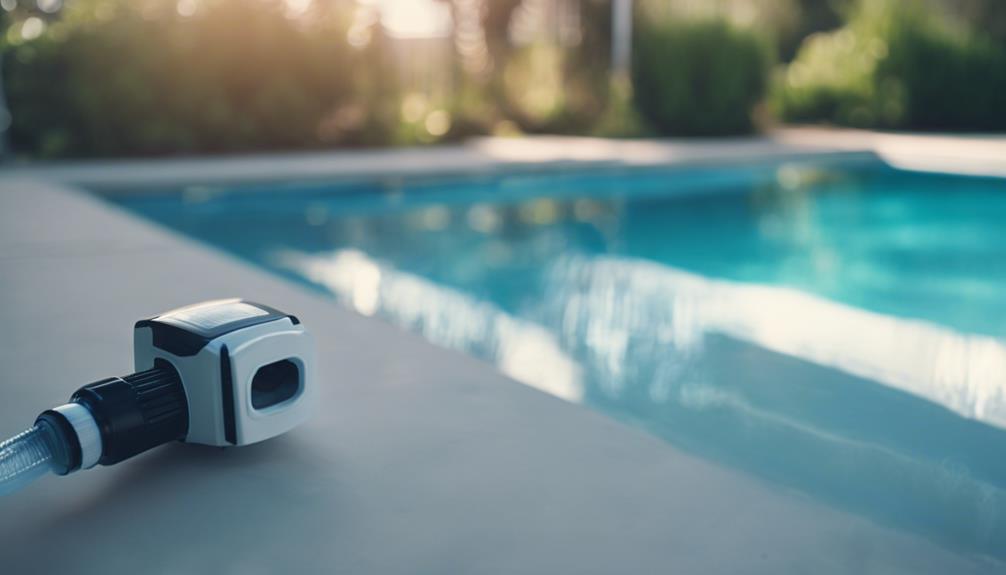
UV pool systems utilize ultraviolet light to disrupt the DNA of viruses and parasites, effectively purifying pool water.
The benefits of UV include rapid water cleaning, gentle treatment on pool equipment, and cost-efficient sanitization.
When considering UV pool systems, it's important to factor in the potential need for supplemental chlorine to guarantee thorough bacteria elimination.
UV Purification Process
Utilizing ultraviolet light, the UV purification process in pool systems effectively damages the DNA of viruses and parasites present in the water. This method offers several advantages over traditional chlorine-based systems:
- UV purification can clean pool water up to 3,000 times faster than conventional methods, ensuring a quicker and more efficient sanitization process.
- The ozone system generated by UV light acts as a powerful oxidizer, converting into gas to effectively purify the water without leaving any harmful residues behind.
- UV pool systems are gentle on pool equipment, reducing maintenance needs, and are known to be more cost-effective and energy-efficient compared to chlorine alternatives.
Benefits of UV
With UV pool systems, you can enjoy cleaner water and more efficient sanitization without the drawbacks of traditional chlorine-based methods. UV light systems utilize ultraviolet light to damage the DNA of viruses and parasites present in the water, ensuring a healthier pool environment.
Compared to chlorine for swimming pools, UV systems can clean water an impressive 3,000 times faster, providing quick and effective purification. The ozone generator incorporated within UV pool systems converts ozone produced by UV light into gas, facilitating efficient water purification without harsh chemicals.
Not only are UV ozone systems gentle on pool equipment and the water itself, but they also contribute to lower overall sanitization costs and are energy-efficient. By opting for a UV pool system, you're investing in a sustainable and healthy pool maintenance solution that prioritizes cleanliness and effectiveness.
Installation Considerations
When establishing a UV pool system, make sure to position the UV light unit correctly for maximum effectiveness in sanitizing your pool water. Proper installation is essential to guarantee optimal performance and efficiency.
Here are some key considerations to keep in mind:
- Placement: Place the UV light unit after the pool filter to ensure that the water is adequately filtered before being exposed to the UV light. This sequence helps maximize the UV system's effectiveness in eliminating bacteria and viruses from the water.
- Sizing: Ensure that the UV system is appropriately sized for your pool's volume. A system that's too small may not provide sufficient exposure to the UV light, compromising its sanitizing abilities. On the other hand, an oversized system may lead to unnecessary energy consumption.
- Maintenance: Regularly check and clean the UV lamp to maintain its efficiency. Over time, the lamp may accumulate debris or mineral deposits that can hinder its performance. By keeping the lamp clean, you can ensure consistent and reliable sanitation for your pool water.
Ozone Generators
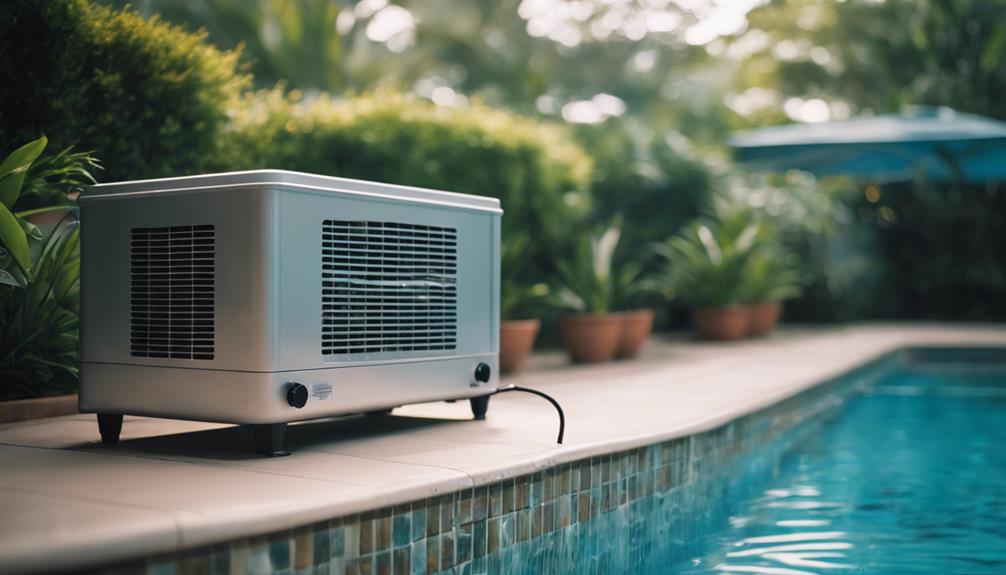
Ozone generators play an important role in cleaning pool water without chlorine by introducing ozone gas for sanitization and purification. Ozone, a powerful oxidant, can clean pool water 3,000 times faster than chlorine, effectively eliminating contaminants.
This alternative method isn't only efficient but also safe, as ozone gas is gentle on the skin and harmless to pool equipment. By utilizing ozone generators, you can lower sanitization costs and benefit from their energy-efficient properties for pool maintenance.
Additionally, when ozone is used alongside chlorine, it can provide a thorough cleaning approach for your pool water. Embracing ozone generators as part of your pool maintenance routine can offer you a clean and safe swimming environment while reducing the reliance on traditional chlorine-based methods.
Mineral Systems
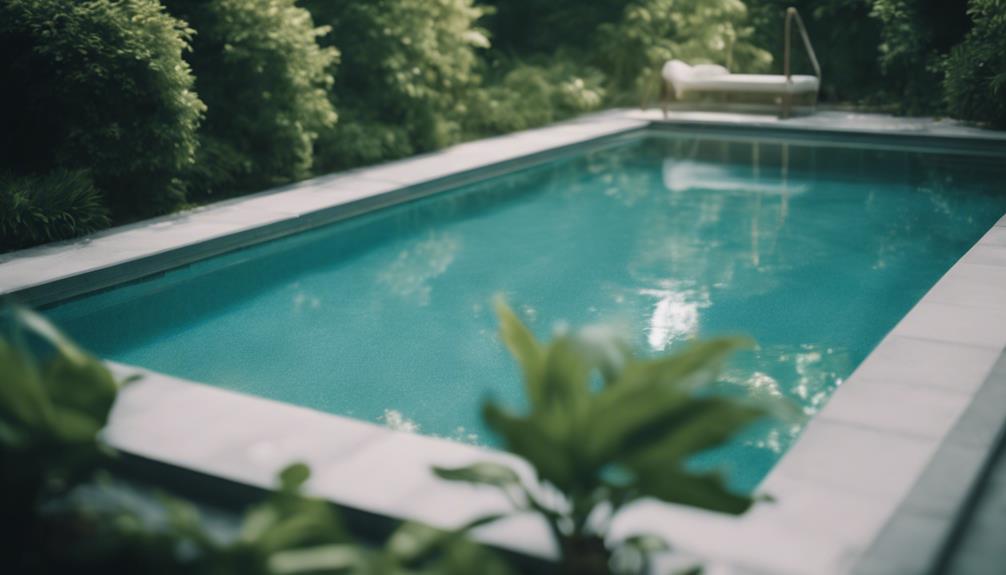
Mineral systems for pool water maintenance introduce copper and ionic silver to combat bacteria and algae effectively. Copper serves as a potent algaecide, while silver acts as a bactericide for thorough sanitation.
These systems utilize active or passive methods to release mineral ions, providing a natural and efficient alternative to traditional chlorine.
Mineral Benefits Explained
Introducing copper and ionic silver ions into your pool water through mineral systems effectively combats bacteria and algae, providing natural and efficient sanitization.
Here are the benefits explained:
- Algaecide Power: Copper ions in mineral systems act as potent algaecides, preventing the growth and spread of algae in your pool water.
- Bactericide Action: Ionic silver ions function as bactericides, effectively eliminating harmful bacteria and contaminants, ensuring a clean and safe swimming environment.
- Continuous Sanitization: These mineral ions work actively or passively to keep your pool water clean and clear, offering a natural and effective alternative to traditional chlorine-based methods.
Installation and Maintenance Requirements
To properly maintain a mineral system for pool sanitization, regular monitoring and adjustment of the mineral ion levels are essential to guarantee effective water treatment. Mineral systems rely on the introduction of copper ions, acting as algaecides, and silver ions, functioning as bactericides, to combat bacteria and algae growth in the pool.
These systems can release mineral ions actively through electrodes or passively through flow-through cartridges, providing continuous water treatment. Maintenance of mineral systems involves consistently checking and fine-tuning the mineral ion levels to uphold ideal pool sanitation standards.
Enzyme Pool Cleaners
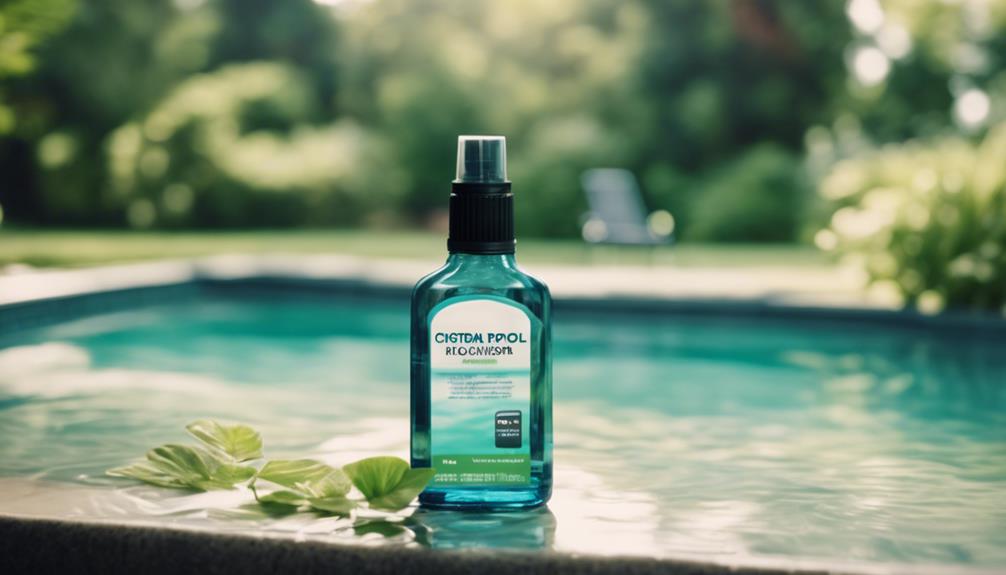
Enzyme pool cleaners efficiently break down oils, lotions, and debris present in pool water, promoting clearer and odor-free swimming conditions while reducing reliance on traditional chlorine. These cleaners work by using enzymes to digest contaminants, ultimately reducing the amount of organic matter in the pool water.
Here are some key benefits of using enzyme pool cleaners:
- Maintain Water Clarity: Enzymes help break down organic materials, preventing cloudiness in the pool water and ensuring a sparkling clean appearance.
- Reduce Unpleasant Odors: By targeting oils and lotions, enzyme pool cleaners help eliminate foul smells, creating a more pleasant swimming experience.
- Biodegradable and Safe: Enzyme pool cleaners are environmentally friendly and safe for swimmers, pets, and the ecosystem, making them a sustainable option for pool maintenance.
Alternative Methods for Clean Pool Water

Consider exploring various alternative methods for maintaining clean pool water that do not rely on traditional chlorine. These methods offer effective ways to sanitize your pool without the use of harsh chemicals. Here are some alternatives to chlorine that you can consider:
| Alternative Methods | Description |
|---|---|
| Salt | Saltwater pools use a salt-chlorine generator for sanitization without traditional chlorine. |
| UV Light | UV pool systems eliminate bacteria and viruses in water without the use of chemicals. |
| Ozone Gas | Ozone generators efficiently oxidize contaminants in pool water, reducing the need for chlorine. |
| Mineral Systems | Mineral systems utilize copper and silver ions to sanitize pools naturally and effectively. |
| Enzyme Pool Cleaners | Enzyme pool cleaners break down organic matter in water, helping to keep it clean without chlorine. |
Exploring these alternatives can provide you with options that are both effective and eco-friendly, ensuring your pool water remains clean and safe for swimming.
Frequently Asked Questions
Is There a Way to Clean a Pool Without Chlorine?
Yes, you can clean a pool without chlorine by utilizing alternative methods such as:
- Bromine
- Ionizers
- Ozonators
- PHMB
- Saltwater pools
- UV pool systems
- Ozone generators
- Mineral systems
- Enzyme pool cleaners
These alternatives offer effective ways to sanitize pool water without relying on traditional chlorine-based methods. Each method has its unique benefits and considerations, providing pool owners with options to maintain clean and safe swimming environments without chlorine.
Is There an Alternative to Chlorine for Pools?
Yes, there are alternatives to chlorine for pools. Options like salt systems, mineral sanitizers, and UV ozone systems offer effective ways to maintain pool cleanliness.
While chlorine is a common choice, these alternatives provide reliable sanitation without the strong chemical odor and potential skin irritation. Consulting professionals for advice on selecting the best alternative can guarantee the best possible pool sanitation.
Explore various options to find the most suitable alternative for your pool's sanitization needs.
What to Do if Your Pool Has No Chlorine?
If your pool has no chlorine, it's important to address the issue promptly to maintain water quality and safety.
Test pH, alkalinity, and sanitizer levels regularly to guarantee proper balance.
Consider alternative sanitizers like bromine, ionizers, ozone generators, or mineral systems.
Explore natural options such as saltwater systems or enzyme cleaners.
Consult with pool professionals to determine the best alternative method for your specific pool needs.
Regular maintenance routines are essential for keeping your pool clean and safe without traditional chlorine.
What Does a Pool Need Besides Chlorine?
To maintain a pool, besides chlorine, you need proper maintenance, filtration, balanced pH levels, and sufficient circulation.
Alternative sanitizers like bromine, ionizers, ozone generators, PHMB, saltwater systems, UV systems, mineral systems, and enzyme cleaners are beneficial.
Ionizers and ozone generators can reduce chlorine needs while effectively sanitizing water.
Choosing the right combination of alternative sanitizers based on pool size, usage, and environmental factors is essential for clean pool water without chlorine.
Are There Effective Alternatives to Chlorine for Keeping Pool Water Clean?
Yes, there are effective alternatives to chlorine for keeping pool water clean. A chlorine wash for pool can be replaced with UV or ozone systems, hydrogen peroxide, or saltwater chlorination. These alternatives can provide a more gentle and eco-friendly approach to keeping your pool water free of harmful bacteria and algae.
Conclusion
To sum up, when it comes to maintaining a clean pool without chlorine, there are several alternative methods available to explore.
From bromine to ionizers, ozonators to mineral systems, there are options to suit different preferences and needs.
By exploring these alternatives, you can enjoy a sparkling pool without the use of traditional chlorine.
Remember, a clear pool isn't just a reflection of water quality, but also of your commitment to a healthier and more sustainable approach to pool maintenance.



